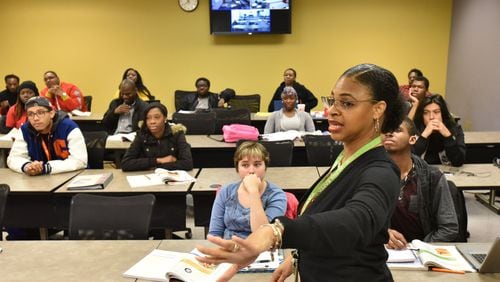Two Georgia schools are scheduled to announce Wednesday a wide-ranging parternship they hope could become a national model.
Clark Atlanta University and Georgia Piedmont Technical College have collaborated on a multilayered arrangement they say will help aspiring students and current students on both campuses and boost enrollment. The schools hope to have the partnership in place by the fall semester.
The main components:
- students who don't meet CAU's academic admissions standards can take remedial courses at GPTC with an eventual goal of enrolling at CAU.
- CAU doctoral students can teach at GPTC. The doctoral students will likely be paid by GPTC.
- GPTC students studying a particular program can eventually study the same major at CAU and graduate with a degree in that subject.
- CAU students can study courses and earn a specialized certificate in a subject such as project management while still earning a four-year degree at CAU.
“It gives them enormous opportunities to excel,” said Peter Nwosu, Clark Atlanta’s provost and vice president for academic affairs.
GPTC president Jabari Simama , who earned his master’s degree from CAU and taught there began discussions with CAU president Ronald A. Johnson about the partnership about a year ago. The two schools worked out the details of the arrangements over the past six months. A joint implementation committee will provide periodic reports on its progress.
Leaders of Georgia’s technical college system, which includes GPTC, have encouraged its schools to explore ideas that help its students. There’s been discussion nationally in recent years about ways two-year institutions can assist its students into enrolling in a four-year school.
Some states, like Virginia, have programs that help students work through various community colleges to earn a four-year degree. But those are all public schools, noted Lygie Hinkle, a Vanderbilt University doctoral student who studies such partnerships between colleges.
Higher education experts such as Ben Miller of the Center for American Progress say it’s rare for a two-year public college such as GPTC and a four-year university such as CAU to embark on such an agreement.
Miller, senior director for post-secondary education at the Washington, D.C.-based center, said CAU can benefit in many ways through this partnership. Students who transfer from a two-year college typically graduate at higher percentages than others, he said, which could boost CAU’s graduation rate. Miller also noted CAU is keeping options open for students who may get discouraged about applying to college.
“A lot of times, if a place says you are not college ready, they stick them in a remedial class where they may not succeed or simply reject them to figure out what’s next (for their lives),” he said.
Simama said the partnership’s success will rely upon financial support from donors and foundations if, as expected, enrollment grows to provide scholarships and financial aid to the additional students.
Simama said it was important to him to partner with a historically black college and university such as CAU for several reasons. In recent years, he noted, there's been friction between HBCUs and many two-year colleges with large black student enrollments competing for the same students and funding, particularly after the Obama administration proposed free tuition at community colleges. Many HBCUs saw that as a threat to their existence.
“We don’t need to compete,” Simama said. “We need to cooperate and we need to collaborate.”
Clark Atlanta University
Location: near downtown Atlanta
Enrollment: 3,800 students
Tuition: $15,900
Four-year graduation rate: 66 percent
Source: Clark Atlanta University
Georgia Piedmont Technical College
Location: Main campus in Clarkston; others elsewhere in DeKalb, Morgan, Newton and Rockdale counties
Enrollment: 5,627 students
Tuition: $1,692 per semester for Georgia residents
Graduation rate: 78 percent
Source: Georgia Piedmont Technical College
About the Author







